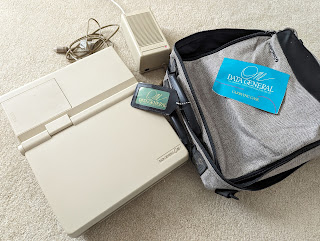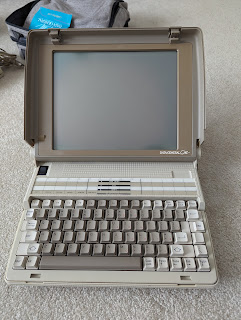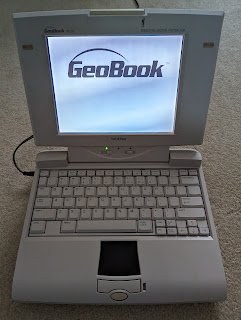Ah, what the heck. I finally got a round tuit. That makes it time for ... another Refurb Weekend.
Saturday, March 30, 2024
Refurb weekend: Data General/One (and the worst LCD in the world)
Friday, June 23, 2023
O Brother GeoBook, Let's Get Thou back on the Internet?
Every rule's got an exception, though:
I will try to pick up x86-based systems with "personality" (as I see fit). The PCjr, for example, had personality: love it or loathe it, it was definitely different. And the Brother GeoBook series of laptops were certainly different too, late 1990s appliance-style laptops sold at low-end prices intended for basic home tasks. Besides their chunky form factor, flash memory instead of a hard disk and an entire operating system in ROM, that operating system they ran was also different: PC/GEOS, the bigger spiritual sequel to the GEOS operating system for the Apple II and Commodore 64/128. Out of the box and built-in, you got a capable word processor, spreadsheet, drawing program, file manager, and basic personal information management, plus pervasive fax support for the included fax/modem. If you wanted, you could even install a basic web browser and E-mail client included on floppy disk.And by golly, I do mean basic. But it was notable that a browser option existed at all, so we should make it live again. Let's take a tour around the unit's built-in applications and explore its guts, then get its PPP connection working again over null modem, hack the browser to understand what an HTTPS URL is and forward it to a Crypto Ancienne proxy, and get the GeoBook back on the Web and accessing current sites. Slowly — but it works! No Betteridge's law around here! (Teaser: see it load Hacker News and Lobste.rs at the end.)
But first, how on earth did GEOS get into the ROM of a chonktastic plastic laptop?
Friday, May 19, 2023
The KIM-1 that sounds like Stephen Hawking (or: "jitbanging" DECtalk)
The KIM-1's serial lines are connected to the last and smallest member of Digital Equipment Corporation's true DECtalk hardware speech synthesizers, the 1994 DECtalk Express. The DECtalk's classic default voice heard in this video is Perfect Paul, which (with adjustments) was the voice of Dr Stephen Hawking as produced with the 1988 Speech Plus CallText 5010.
The 15 keys we can read off the KIM's hexadecimal keypad are polled by a "talker" program that sends the DECtalk Express words and phrases to speak. However, although the KIM-1 has 20mA current loop output you can turn into RS-232 serial, its built-in ROM routines can't reliably communicate at the 9600 baud rate the DECtalk Express demands.
So, in today's entry, we have a veritable smorgasboard of geriatric geekery: using our KIM-1 serial uploader to push a program for execution, let's write a bitbanged 9600 baud serial transmitter routine in 6502 assembly and let the KIM-1 have its say — and crack the DECtalk Express open and look at the insides while we're at it. (Teaser: you'll find its CPU very familiar.)


